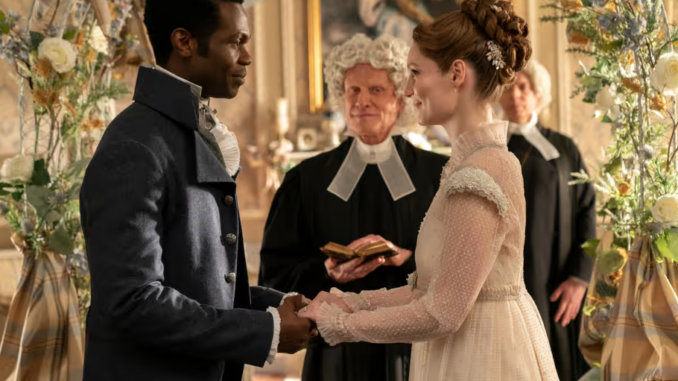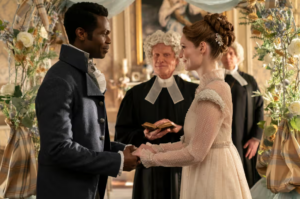
‘Fun, quirky and romantic’: why everyone wants Bridgerton music at their wedding
The Regency drama is the reason couples say ‘I do’ to a beloved orchestral score
When Rachael Armstrong got engaged to her now-husband Chris in 2021, one of the first wedding decisions she made was the music that would accompany her debut.
“I had a vision in my head before we got engaged – I knew it would be romantic but also a little fun and quirky,” she says. And so, when the day came for her to walk down the aisle, she did so to a violin arrangement of Canadian pop singer Carly Rae Jepsen’s 2015 hit I Really Like You.
The Armstrongs are among a growing number of couples choosing to soundtrack parts of their weddings with contemporary songs performed in a classical style – a trend that is thought to be partly linked to the popularity of Netflix series Bridgerton. The Regency period drama first aired in December 2020, and throughout the series has featured orchestral remixes of pop songs such as Robyn’s Dancing On My Own, Miley Cyrus’ Wrecking Ball and Taylor Swift’s Wildest Dreams.
A 2023 spin-off series, Queen Charlotte: A Bridgerton Story, is even set to release alongside a classically-inspired remake of Alicia Keys’ 2003 hit If I Ain’t Got You, which the singer re-recorded with an orchestra of women of colour.
“I’ve been doing weddings since 2018 and everything happened so quickly after Bridgerton,” says Jay Émme, a cellist who specializes in weddings and events and was part of Keys’ backing band. “I’ve always had a few pop songs in my repertoire, but in the past, couples would hear a piece by someone like Mozart or Bach and ask for that. Then Bridgerton came along and it exploded.”

Some couples request music straight from the show, including Keys’s song, Émme says, while others want something more bespoke; one recent couple asked for a mix of the traditional bridal theme and Earth, Wind & Fire’s 1978 hit September. Another couple asked if she could do a drum and bass remake. And she says “there’s always a lot of Taylor Swift.”
Craig Parker, guitarist for Scottish wedding band Franco, says Swift is also one of the most requested musicians for acoustic ceremonies and receptions, where he plays alongside a violinist.
He’s been offering the service for about eight years but demand has increased in the past four years, he says, averaging two bookings per weekend, every weekend.
“When you have a violin, it’s a bit more traditional and sounds nice and classy in a normal ceremony room setting – but most people still want to hear a song they know,” he says. “It’s nicer to have someone playing live rather than playing it through a speaker, but it’s still a bit more relaxed than having a singer play it.”
“It gives it a sophisticated vibe,” agrees Émme. “There’s something about strings and classical music at a wedding – a lot of people don’t get to hear live instruments very often, but they still want to hear their old favourites. It’s like breathing new life into their old favourites.”
Both Émme and Parker say they’re often booked as background music for key moments – the ceremony, the signing of the registry and the entrance ceremony – while traditional pop music still has a place at the end of the evening.
“We still want to sing and dance to our favourite songs when we get to the party,” says Armstrong. “But we wanted something special for the ceremony that felt emotional and ‘us’. “A lot of guests said it took them a while to realise what the song was because they thought it was just classical music – but when they did, it was really memorable.”
For Émme, the process of adapting a pop song is as rewarding as her traditional classical training. “In a way [couples who want something unique and individual] are my ideal match because I used to be angry at the classical system,” she says. “I love orchestral work and the excitement of it – the bigger the better – but having the freedom to play things you know and love, and things you hear on the radio day in and day out, creates a lot of variety and a lot of fun.
“If there’s something you love and it’s not classical, there’s almost always a way to play it on a classical instrument. There’s almost nothing that’s impossible.”
